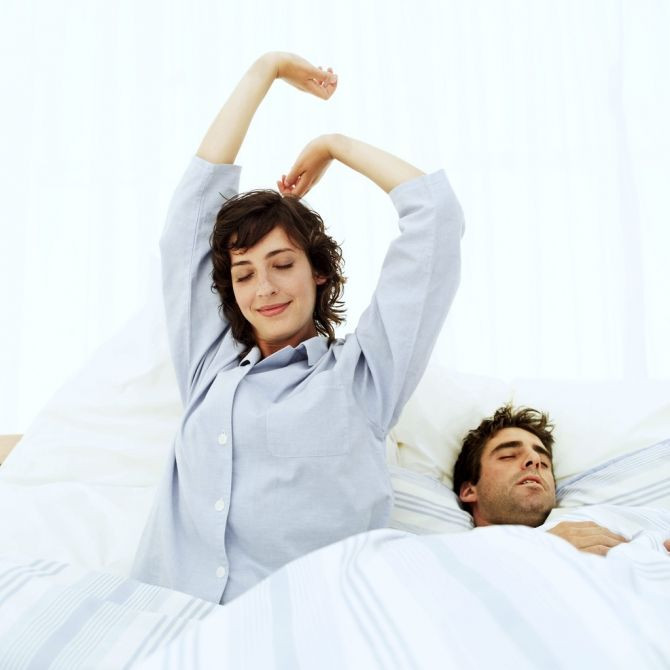Surprising Reasons Why Sleeping with Someone is Better than Sleeping Alone

Couples sleeping on the same bed may live longer and be in better health that people who sleep by themselves, experts say.
In fact, some researchers believe that sleeping with a partner may be a major reason why people in intimate relationships tend to be in better health.
Several studies have found that women generally don't sleep as well with a partner and wake up more often during the night compared to men who slept the same when in a shared bed, and both men and women move more when sleeping on the same bed.
Another recent UK survey revealed the average couple has 167 bedroom arguments a year mostly caused by irritating bedroom habits like hogging the sheets, snoring, rolling to the wrong side of the bed and cold feet.
The survey also found that at least 20 percent of the 2,000 adults in a relationship that answered the survey claimed that they lose at least two hours of sleep a night because of a partner's snoring, and an alarming one in ten adults have considered leaving their partners because of bad night's sleep had become a big problem in their relationship.
Mismatched body clocks between partners can also put a strain on the relationship, Jeffry Larson, a professor of marriage and family therapy at Brigham Young University in Provo, Utah told Andrea Petersen from the Wall Street Journal.
In a 1991 study, Larson found that couples with mismatched body clocks, like one of the people in the relationship being a night owl and another being an early bird, argued more, spent less time together in shared activities and had less sex than matched couples.
However, some sleep experts are now saying that, despite all the annoyances with sleeping with someone else, snoozing together is actually significantly better than falling asleep alone, according to the Journal.
"Sleep is a critically important health behavior that we know is associated with heart disease and psychiatric well-being," Wendy Troxel, an assistant professor of psychiatry and psychology at the University of Pittsburgh, told the Wall Street Journal.
"It happens to be this health behavior that we do in couples," she said.
One of 2009 Troxel's studies found that women in long-term stable relationships fell asleep quicker and woke up less often during the night compared to single women or women who have lost or gained a partner during the six-to eight-year period of the study.
Troxel suggests that sleeping with a partner may promote feelings of safety and security leading to lower levels of the stress hormone cortisol, lower levels in cytokines that can cause inflammation, and higher levels of the so-called love hormone, oxytocin, which has been shown to ease anxiety and is produced in the same part of the brain responsible for the sleep-wake cycle.
Troxel said that even though sharing a bed may make people move more, "the psychological benefits we get having closeness at night trump the objective costs of sleeping with a partner," according to the Journal.
In a 2007 study, published in the journal Sleep and Biological Rhythms in 2007, researchers found that women woke up more during the night when they have someone by their side, while men slept the same when alone or when with a partner.
However, women reported that they slept better only on nights they had sex, even though their actigraphs, wrist devices that record movement during sleep, showed otherwise.
John Dittami, a behavioral endocrinologist and biological rhythms specialist at the University of Vienna, who led the research found that in fact women's sleep was even more disrupted on nights they had sex.
"Women enjoy male presence psychologically even though it costs them minutes or even hours of sleep," Dittami suggested. He also suggests that women may be more easily disturbed by their partners because they are more sensitive to their environments.
In another 2010 study, co-authored by Troxel, researchers found that what couples do during the day can affect their sleep.
Women who reported fewer negative interactions with their partners during the day slept better that night, and men who had better sleep reported fewer negative interactions with their partners the next day.
Researchers also found that when women reported having more positive interactions with their partner and fewer negative ones, their male counterparts slept better at night.
"Women tend to drive the emotional content of the relationships," Troxel told the Journal. "Husbands may take up a stronger signal" from wives.
Christina McCrae, associate professor at the University of Florida and president of the Society of Behavioral Sleep Medicine told the Journal that clearing up a relationship issue can sometimes ease insomnia and she has seen many of her patients' sleep improve after underlying relationship problems were addressed with their partners during sleep-therapy sessions.



























